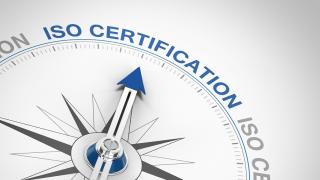
Certifications and approvals are common in most - if not all - industries, but within the field of manufacturing, they become especially important. The manufacture of physical products, some of which are destined for safety-critical applications, requires closer scrutiny and expectations from end customers. This is where certification comes into play, illustrating to existing and potential customers alike that your business operates to the required standard.
There are many different manufacturing certifications to consider, all concerning different areas and vertical markets. Here are five of the most common certifications and approvals to consider as a manufacturer:
ISO 9001:
ISO 9001 certification demonstrates that quality is of paramount importance to the company in question.
Probably the most common manufacturing standard is ISO 9001, which directly pertains to quality control. ISO 9001 is commonly required by a plethora of vertical industries in order to demonstrate consistent performance in all areas. ISO 9001 requires companies to adopt a process-led methodology, as well as forensically analysing any errors as and when they occur. This means that the cause of errors is quickly identified and rectified, leading to continuously-evolving improvement across all areas of the business.
As production errors can result in expensive knock-on effects throughout the rest of the supply chain, ISO 9001 certification demonstrates that quality is of paramount importance to the company in question. The constant evaluation of processes and their results means that ISO 9001-certified companies are often more efficient and productive. ISO 9001 also requires a heightened level of customer feedback and satisfaction, meaning that potential clients will feel reassured that their business is in safe hands.
READ: Why Should You Be Certified to ISO 9001?
AS 9100:
The manufacture of all manner of aircraft parts will often require the manufacturer to have AS 9100 in place.
AS 9100 - or EN 9100 within the UK - is a standard primarily for companies that work within the aerospace industry. Being such a safety-centric sector, aerospace is heavily regulated and companies breaking into this field will need to be certified to AS 9100 if they want to progress. This is because the manufacture of all manner of aircraft parts - even down to catering equipment - will often require the manufacturer to have AS 9100 in place.
AS 9100 has its roots in ISO 9001, but also contains plenty of requirements that are exclusive to the aerospace sector. These requirements address areas such as safety and component quality, ensuring that they satisfy the rigorous standards of the aviation industry.
Companies who have AS 9100 certification in place can expect to be audited on a regular basis. This is to ensure that quality standards remain at the required level to ensure continuous safety throughout the industry.
READ: How To Get Into Aerospace Engineering - A Guide For Subcontract Suppliers
TS 16949:
Companies involved in any aspect of an automotive supply chain may need to have TS 16949 in place.
Companies that manufacture parts for the automotive industry will be familiar with TS 16949. TS 16949 serves the automotive sector and ensures that mistakes and defects are detected early so as to be prevented in future. Like AS 9100, TS 16949 builds upon the standards of ISO 9001, tailoring them in a way to meet the requirements of the automotive industry specifically.
Companies involved in any aspect of an automotive supply chain may need to have TS 16949 in place. Customer-specific requirements are centric to this standard, meaning that suppliers may need to adapt to the needs of different automotive manufacturers.
Customer satisfaction is another key element of TS 16949, alongside waste reduction throughout the supply chain. This - along with defect prevention - helps to build a streamlined, effective production standard that serves to improve the automotive industry overall.
READ: Breaking Into the Automotive Industry
UKCA/CE Mark:
Both the UKCA and the CE Mark signify that a product is safe for use.
The CE Mark has previously been commonplace on manufactured goods, ensuring that they meet the required health and safety criteria. However, as the CE Mark is a European standard, it has now been replaced by the UKCA mark within the UK post-Brexit. It's important to note that this only applies to products sold within the UK; those sold within Europe, including Northern Ireland, will still require a CE Mark.
For those who are looking to make the transition from the CE Mark to the UKCA Mark, the technical specifications across both markings are more or less the same. Most manufacturers will be able to continue using the CE Mark until 1st January 2022, although this is not universally accepted and others will need to adopt the UKCA Mark from the beginning of 2021.
Both the UKCA and the CE Mark signify that a product is safe for use and has satisfied the relevant regulations surrounding health and safety. Whilst these markings are commonly seen across a whole range of vertical sectors, consumer products and construction in particular often have to obtain these markings before going to market.
READ: How Will Brexit Affect UK Subcontract Sourcing?
ISO 13485:
ISO 13485 ensures medical devices are designed, manufactured and inspected with safety in mind.
ISO 13485 pertains to manufacturing for the medical sector. Like AS 9100 and TS 16949, it closely follows the requirements of ISO 9001; however, it is a separate certification that addresses the specific needs of medical manufacturing, whilst omitting some of the requirements of ISO 9001 that are not relevant to this particular area.
Like aerospace and automotive, the medical sector depends upon the design and production of high quality components. The risks associated with poor quality within this field could endanger human lives; therefore, it's absolutely essential that manufacturers adhere to a stringent set of criteria to ensure that errors do not occur. ISO 13485 is a quality management system that ensures medical devices are designed, manufactured and inspected with this in mind. It also demands complete traceability throughout the supply chain.
ISO 13485, unlike many of its counterparts, does not require manufacturers to continuously improve their production processes. Instead, manufacturers are expected to maintain a level of quality that upholds the requirements of the standard. Much like AS 9100, companies that hold the ISO 13485 certification are audited regularly to ensure continued compliance.
